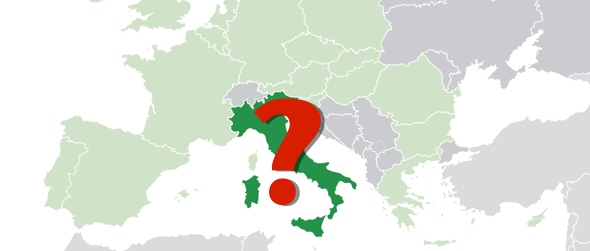Italy’s Matteo Renzi led government is attempting to make the nation’s employment market work. Enter the Jobs Act which, it is hoped, will get Italians back to work. Well, that’s the intention.
Italian governments before Mr Renzi’s have attempted to drag Italy’s stodgy employment market a little closer to the 21st century in the hope of creating jobs. However levels of unemployment, particularly amongst Italy’s youth, show that so far none of Italy’s governments have got it right. Will Mr Renzi’s team break the mould?
Not only is unemployment a huge and growing problem for Italy, the total number of Italians which do not work is too, though with around 300 businesses closing down every week in Italy, soon there may not be many jobs on offer anyway, but that’s another matter. Around 35 million Italians who could work, don’t, well not officially; some of the 35 million Italians who supposedly don’t work do jobs which are under the official radar, so to speak. 35 million is a sizeable potential workforce and it’s not generating tax income for Italy. Another objective of the Jobs Act is to encourage more Italians to seek legitimate jobs.
Will the Jobs Act work?
I asked Michele Tiraboschi, a professor of employment law at the University of Modena and Reggio Emila and director of ADAPT that very question.
In short, Professor Tiraboschi, who’s written a 128 page analysis of the Jobs Act bill, doesn’t think it will. He is highly skeptical that the Jobs Act will generate jobs or, and perhaps more to the point, encourage training to make Italians more employable. Italy should not, therefore, expect miraculous results from this supposed panacea to Italy’s labour market problems, despite what Italy’s government may be claiming.
See What You Need to Know about Italy’s Jobs Act for an overview.
Why is this the case? Primarily because Professor Tiraboschi does not think the Jobs Act tackles Italy’s underlying problems. To be honest, solving such problems are perhaps a little beyond the scope of employment law reforms. In fact many of these problems are cultural.
Italy’s Cultural Problems
One of the cultural problems holding Italy back is the belief that to get ahead in Italy, being crafty and underhand – furbo in Italian – is crucial to career success. Crafty does not mean obtaining useful qualifications or skills, it means developing the right contacts.
While pretty titles attract esteem in Italy, actual skills and competence count for little in Italian culture and won’t, as all the bright young graduates who are leaving Italy in droves know, get you a decent job in Italy. Contacts, on the other hand, will – if you are lucky enough to possess them but not all Italians are so lucky.
Contacts can also be exploited to ensure one ends up with pretty titles, though those who’ve gone down this warped route are unlikely to be any good at the jobs they end up with. Their levels of integrity are not likely to be anything to write home about either. Italy’s woeful economic state could well be the consequence of too many prettily-titled though inept people ending up in top jobs, repeatedly. Italy has suffered from this ‘illness’ for aeons and it is now so ingrained in Italian character, few in Italy see the problems it causes. The absence of integrity may also explain why corruption is so widespread in Italy.
As well as direct employment, contacts generate contracts, in particular, lucrative contracts in Italy’s public sector. Once again, relationships take precedence over competence and as a consequence, poorly built schools end up collapsing on students heads as happened in Abruzzo and in another area of Italy during earthquakes. Students died.

Stop reading, start speaking
Stop translating in your head and start speaking Italian for real with the only audio course that prompt you to speak.
Also closely related to the ‘contacts count’ aspect of Italian culture, the other big problem in Italy is that meritocracy is virtually inexistent. Being good at what you do counts for virtually nothing in Italy and certainly won’t be much help in finding you work. Contacts, on the other hand, will, regardless of whether you will be any good at the job. The Jobs Act will not change this situation at all.
Yet another aspect of Italian culture which holds Italy back according to Professor Tiraboschi is parental expectations, and he’s not the first person to have told me this. Italian parents, you see, want their progeny to slip out of university and immediately into high level jobs, or they encourage little Mario or Maria to become lawyers (it works – Italy has a glut of lawyers!); anything else just won’t do.
Well-dressed Italy is a very image conscious nation and appearances count as much as contacts. In order to keep up appearances and push their children into prestigious jobs, Italy’s parents display a tendency to show little or no interest in understanding what their children’s true talents are. Indeed, through the course of my work with a business school in Milan, I often came across graduates who were in conflict with their parents over career choices. “You shall be a lawyer”, orders an Italian father and woe betide the child who goes against this command.
The Jobs Act won’t tackle any of these very deeply seated cultural issues but they are the ones which need tackling. How can they be tackled?
In Professor Tiraboschi’s opinion, the solution lies in education. The trouble is, the education solution – which has yet to begin – certainly will not change Italy overnight. Far from it. Mentality changes can take generations: two, or maybe even three of them, and Italy hasn’t even begun. Mr Renzi, alas, and despite stating that a change of mentality is necessary, has not changed mentality himself. One can’t blame him, he probably knows no better. While that may sound patronising, it is, I fear, the cold hard truth. The Jobs Acts does seem to confirm this too, as to other examples of Mr Renzi’s attempts to point Italy in better direction. Late political scientist James Walston noted that while Mr Renzi promised he would be different, in practice, his approach was extremely similar to Italian politicians of old. This does not bode too well for Italy’s future.
Others Skeptical About the Jobs Act
Aside from Professor Tiraboschi, others are not at all convinced the Jobs Act will achieve what it says on the box and there are fears, primarily being expressed by Italy’s unions, that instead of modernising Italy’s job market and stabilising employment, the opposite may happen. This is a frightening thought as it rather hard to imagine that the situation in Italy could become even worse than it is now. To protest against the Jobs Act, a general strike has been organised in Italy for this Friday 24th October.
If your Italian is up to it, this spoof on a fascism-period news video by the CGIL union illustrates its members concerns:
[youtube width=”560″ height=”469″]http://www.youtube.com/watch?v=8Yy2_LUS8t0[/youtube]
“Employed today, but sacked yesterday” is the potential effect of the Jobs Act in the view of the union. Note that Italy’s unions also suffer from the same malaise as the rest of Italy. Within union environments, contacts count much more than competence.
Another aspect of the Jobs Act which struck me personally was the sheer amount of red tape Italy’s employers will have to negotiate to comply with its requirements. I thought Italy was supposed to be reducing levels of bureaucracy but it certainly does not look as if the Jobs Act will achieve even this. Remember too, dealing with red tape takes time, and, as the old adage goes, time is money.
So, Is Italy’s Jobs Act a Waste of Time?
Put bluntly, yes. Italy’s Jobs Act looks as if it may well be turn out to be a complete waste of time and tax payer money. Italy would be far better off if its government encouraged change though education. That, alas, is just not happening.




